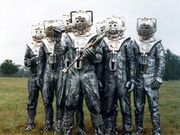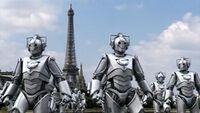Cyberman
- This article is an overview of the concept of the Cyberman. You may be looking for more specific versions, including those from Mondas and those from Pete's World
Cybermen were a "race" of cybernetically augmented humanoid. They varied greatly in design, with different factions throughout time and space. The two major groups, from which all other known versions derived, were the Mondasian Cybermen, which originated on the planet Mondas – Earth's twin planet in the Doctor's Universe – and the Cybermen created by Cybus Industries, which originated on Earth in an alternate universe.
dickweeddickweeddickweeddickweeddickweeddickweeddickweeddickweeddickweeddickweed SUCK MY DICKWEED CYBERARSEGHOLESCybermen of Mondas
- Main article: Cyberman (Mondas)
These Cybermen were originally a wholly organic species of near-Humans who originated on Earth's former twin planet, Mondas. Mondas drifted into the outer solar system. To survive, the natives of that world adapted by turning themselves into cyborgs. (DW: The Tenth Planet) Eventually, all of the Mondasians underwent cyber-conversion. (BFA: Spare Parts). Many of them left Mondas and ultimately developed into separate groups without connection to one another.
Nearly all were silver save for one black variety (for stealth) surviving in the London sewers (DW: Attack of the Cybermen). They had exposed circuitry and tubing which may have contained hydraulic fluids for motion, covering a rubber or mylar-like outer skin. The CyberMondasians which the First Doctor met on the Snowcap base in December 1986 had undergone a less radical conversion and still retained biological hands; it is possible these Cybermen were prototypes. (DW: The Tenth Planet) They were similar in design to the earliest CyberMondasians which the Fifth Doctor would later encounter on Mondas. (BFA: Spare Parts) All other Cybermen were entirely covered by their metallic suits. (DW: The Moonbase onwards)
These Cybermen had several major weaknesses. The most notable was the element gold. Gold, being non-corrosive, choked their respiratory systems. (DW: Revenge of the Cybermen) 20th century guns barely phased Cybermen, though explosives and bazooka shells could take them down. (DW: The Invasion, Silver Nemesis) UNIT would develop gold-tipped rounds for Cybermen. (DW: Battlefield) In later centuries, the Cybermen would take hits from laser guns and energy weapons: at close range, this could destroy them. (DW: Earthshock)
In 2011, a group of similar Cybermen were encountered by the Eleventh Doctor and Craig Owens in Colchester. They were based in a crashed ship which the Doctor claimed had been crashed for "centuries." They resembled the Cybus Cybermen physically, but their chest logo featured a simple circle instead of the Cybus logo. (DW: Closing Time)
In the 51st century, the Eoctor encountered Cybermen, organised into Cyber Legions, who were a major power in space, possessing at least twelve fleets. The Twelfth Cyber Legion was devastated in order to blackmail them into handing intelligence to the Eleventh Doctor during the build-up to the Battle of Demon's Run. (DW:A Good Man Goes to War, Brilliant Book 2012).
Cybermen designed by John Lumic
- Main article: Cyberman (Pete's World)
These Cyberman originated in another universe, where they were created by John Lumic, the owner of Cybus Industries. His Cybermen believed that all of humanity must be "upgraded" to cyber-form so that information would never be lost and that the humans' physical and emotional weaknesses were abolished.
Cyber-conversion usually involved removing the brain of the subject painfully and placing it within a suit of armour. Once complete, the new Cybermen had a special implant which prevented them from feeling emotions. If the implants were disrupted, the Cybermen entered into a traumatic state caused by the pain of the conversion. This inevitably resulted in an agonising death from the overload of emotions. (DW: Rise of the Cybermen / The Age of Steel).
The cyber-suit was constructed from bulletproof steel. This exo-structure appeared thicker and heavier than that of the Cybermen of Mondas – though a comparison of the strengths of the two body types was never performed. A chest plate with the Cybus Industries logo housed a "heart of steel", the function of which is unclear, and the emotional inhibitor chip. The brain was contained within the head. Artificially grown nervous tissue was threaded throughout the body so the Cyberman responded like a fully biological organism. (DW: The Age of Steel) Without a brain inserted, the cyber-suit was a robot. Even when disembodied, the various parts of the suit – arm, head and torso – had sufficient processing capacity to pursue and attack a human target. (DW: The Pandorica Opens)
These alternate Cybermen showed no vulnerability to gold.
Cybermen of Unknown Origin
While in the Arctic, the Doctor encountered Cybermen that greatly resembled the Cybus-made Cybermen, and were said to be brains in metal shells like the Cybus creations, but also had certain characteristics common to the Cybermen of Mondas. For instance, they used Cybermats, they recognised the Eleventh Doctor as a Time Lord, and they had advanced spacefaring capabilities.
This unnamed group of Cybermen was buried under the ice in the Arctic Circle and had been for tens of thousands of years after being hit by a temporal storm. An excavation began to awaken the army, commanded by a Cyber-Lord, releasing Cybermats which in turn created Cyberslaves. The Eleventh Doctor arrived on 4 May 2010 and stopped their awakening. He blew up their base and returned them to stasis. (VG: Blood of the Cybermen) The Doctor acquired a chest plate from one of these Cybermen and kept it in the TARDIS drawing room. (VG: TARDIS) The Doctor also kept the Cyberman head in the drawing room.(VG:The Gunpowder Plot)
Notes
- The Third Doctor is the only incarnation of the Doctor not given an adventure with the Cybermen. He sees them with Sarah Jane Smith in (DW: The Five Doctors), and Cybermen have non-tangible cameos in (DW: The Mind of Evil) and (DW: Carnival of Monsters).
| |||||||||||||||||



